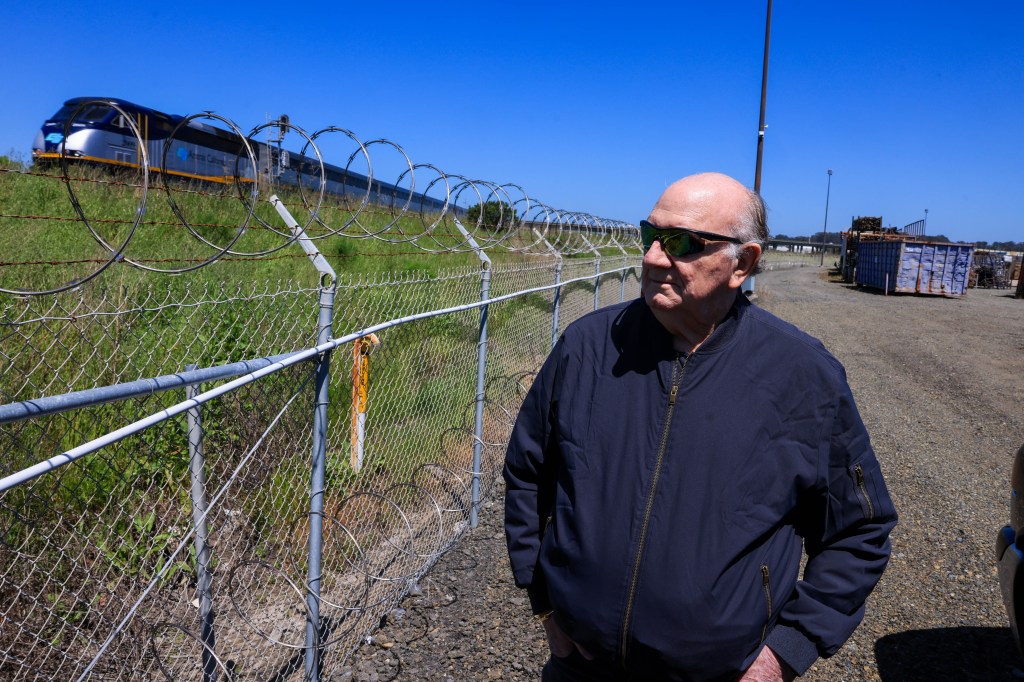RICHMOND — The largest freight railroad company in the nation may have lost its bid to toss out a lawsuit alleging its 1¼-mile Richmond Rail Connector project was improperly built nearly a decade ago and continues to damage a small business nearby.
A Contra Costa County Superior Court judge has tentatively denied a slew of motions — filed by the BNSF Railway Company and a construction engineering consultant — that sought dismissal of the case this week.
BNSF had argued that the suit could seek removal of the track in question, which would be a matter of federal jurisdiction, but Judge John Levine said there is no admissible evidence the plaintiff is asking to shut down.
As a result, the jury trial slated to begin next week was delayed following a hearing Monday — the latest roadblock in an arduous legal battle that’s slogged through the courts for more than seven years.
The case revolves around the Richmond Rail Connector, a $22.6 million Caltrans-approved plan that BNSF and government officials started work on in 2013 to design, rehabilitate and construct 1.25 miles of curved track to transport crude oil and other cargo destined for the Port of Oakland.
But, BNSF and its contractors appear to have overlooked staggering issues during the connector’s construction and maintenance, according to a complaint filed in August 2017 by the property’s owner, Albert Engel Sr.
His amended complaint alleges breach of contract, negligence, specific performance and more regarding the mostly publicly funded Richmond Rail Connector project, which was completed in 2015 and sits less than a mile inland from the city’s marshy shoreline.
As his complaint has slogged through Contra Costa County’s courts, a host of records his legal team gleaned from railroad staff, contractors and scientific experts has allegedly stoked concerns that the connector could spell disaster for Richmond’s shoreline and the entire East Bay.
Engel’s attorneys allege that an unlicensed surveyor conducted all pre-design and pre-construction surveys, BNSF reneged on contractual responsibilities to preserve adequate, unobstructed drainage facilities, and construction crews took shortcuts to meet deadlines associated with the project’s public grant funding.
Engel’s lawsuit alleges that lax construction standards and poor track maintenance has led to overgrown vegetation, homeless encampments and pools of water that at times accumulate around the nearly decade-old berm — problems that he said he fears could potentially foreshadow a train derailment along that track.
BNSF’s lead attorney, Colette Stone, argued on Monday that Engel’s legal team may ultimately advocate for removing the entire rail line during the upcoming jury trial. Stone proposed that the case should be tossed out because state courts are unable to rule on the regulation of railroads, including issues of permitting, construction, and operation.
That remedy, however, has not been requested in any of Engel’s court filings. Instead, his complaint, as it currently stands, is seeking damages.
Moreover, Engel is pushing BNSF to make good on its contract for the easement, in which BNSF promised to indemnify his business for any damages, including flooding and water damage, that result from the alterations of the land to support the Richmond Rail Connector.
But Stone claimed on Monday that removal has been brought up statements made during mandatory settlement conferences.
“The case has now been fully re-engineered, and the issue of preemption is now before the court,” Stone said. “It’s like a game of Whack-a-Mole — is (removal of the track a sought remedy) or isn’t it?”
However, Judge Devine on Monday tentatively denied BNSF’s motion for summary judgment, saying that tort claims involving voluntary agreements between private parties – namely the contract that granted an easement for BNSF to build the Richmond Rail Connector on Engel’s property – are not issues that can be preempted by federal law, such as the Interstate Commerce Commission Termination Act of 1995, as well as U.S. agencies like the Surface Transportation Board.
Since Engel’s lawsuit is asking BNSF to install and maintain proper drainage near the connector line and his property, Devine said the lawsuit cannot be preempted because this case does not aim to directly regulate the railway, and BNSF failed to submit any admissible evidence in support of its motion.
“It’s almost as if you’re rearguing everything in its entirety,” Devine said Monday.
The court also tentatively ruled that the dispute over what exactly caused flooding on Engel’s property is the obvious question at hand and can’t simply be dismissed – dashing hopes of attorneys for JL Patterson & Associates, a third-party construction engineering consulting firm hired to design elements of the connector, including its drainage system to keep water away from the newly constructed berm.
The construction engineering company also argued that Engel’s property has not suffered any actual damage to physical or electrical components of his business, despite Engel’s claims that ongoing flooding issues have negatively impacted business operations and property value.
However, the judge tentatively ruled that questions about the merits of Engel’s allegations that his property sustained damage should be presented to the jury.
As the parties await a final ruling from Judge Devine, all parties will meet again on Sept. 25 to confer about the case and determine a new date to commence the trial.
